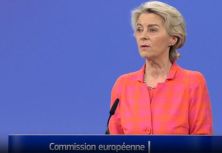NATO member countries have condemned Russia’s decision to withdraw from the Treaty on Conventional Armed Forces in Europe (CFE) and have announced their intention to indefinitely suspend their participation in the treaty. This initiative was unanimously supported by all NATO members, as reported by the Alliance’s press office.
Recognizing the role of the CFE as a cornerstone of Euro-Atlantic security architecture, the situation where NATO member states adhere to the treaty while Russia does not has been deemed unstable. Therefore, NATO member states intend to suspend the CFE for as long as necessary in accordance with their rights under international norms, according to the organization’s statement.
NATO also emphasizes that its members remain committed to effective conventional arms control, viewing it as a key aspect of Euro-Atlantic security. NATO plans to continue consulting and assessing the implications of current security circumstances and their impact on the Alliance’s overall security.
The Treaty on Conventional Armed Forces in Europe was signed on November 19, 1990, in Paris between 16 NATO member states (Belgium, the United Kingdom, Germany, Greece, Denmark, Iceland, Spain, Italy, Canada, Luxembourg, the Netherlands, Norway, Portugal, the United States, Turkey, and France), as well as six states from the Warsaw Pact (Bulgaria, Hungary, Poland, Romania, the USSR, and Czechoslovakia). This treaty entered into force on November 9, 1992.
The agreement imposed limitations on the number of military equipment, including tanks, artillery, helicopters, and aircraft that the participating countries could possess.
Russia’s participation in the treaty was suspended in July 2007 by a decree from President Vladimir Putin, and on November 29, 2007, the corresponding law was adopted.
After Russia announced its intention to fully withdraw from the treaty during the current year, NATO condemned this action, stating that it poses a threat to Euro-Atlantic security.
It’s worth noting that U.S. Secretary of State Antony Blinken expressed confidence in rapid progress regarding Sweden’s NATO membership after negotiations in Turkey. According to Antony Blinken, the United States is very pleased that Turkish President Recep Tayyip Erdogan signed the ratification protocols for Sweden’s NATO accession and submitted them to parliament.













